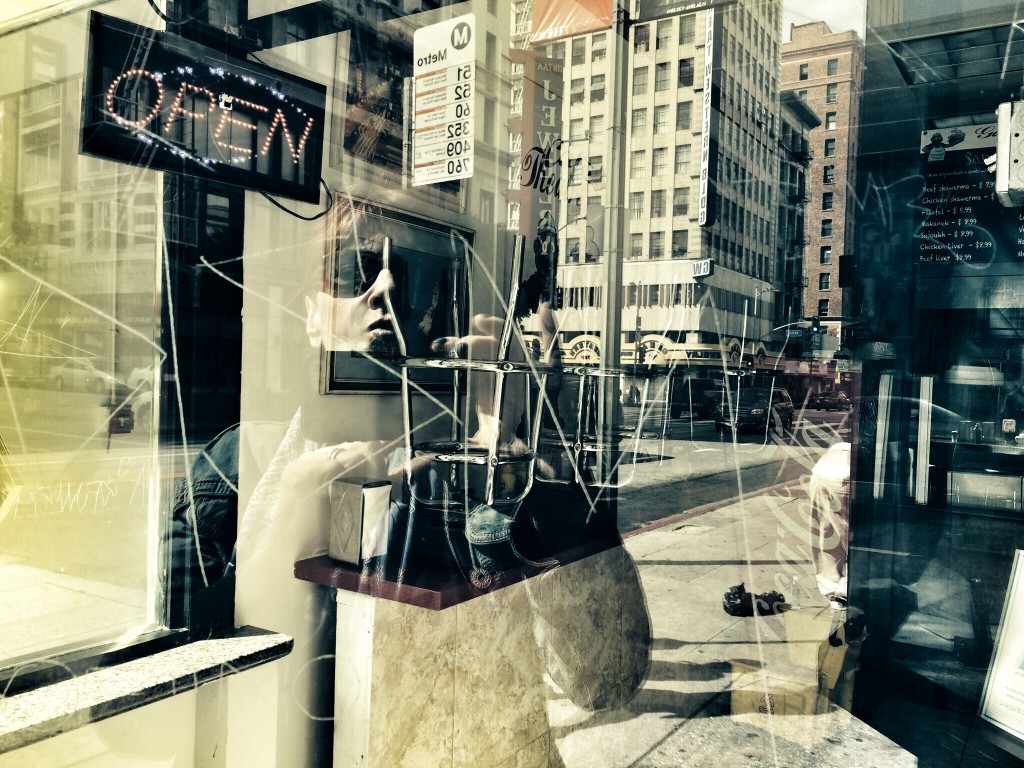GR: Thanks for agreeing to let us interview you for Gyroscope Review. We’re pleased that you are one of our contributing poets. Will you please begin by telling us where you’re from, where you write, and why poetry?
ARF: A life-long Los Angeleno, I’ve lived all over L.A. county, including a childhood in the wilds of Topanga, and a decade on the beach in Venice. These days, my husband and I live and work in an 8th floor, 2,000 sq. foot loft/studio in downtown Los Angeles, where I write on my iMac computer. I write poetry because I am a minimalist at heart and take pleasure in telling stories that are reduced to their bare bones, stories that have room for the reader to step inside.

GR: Who, or what, are your poetical influences?
ARF: Influences include Dorianne Laux, Ellen Bass, Matthew Dickman, Karl Shapiro, Lawrence Ferlinghetti, Anne Sexton, Thomas Tranströmer, Wislawa Szymborska, Edward Field, Louise Glück, and e.e. cummings. I studied for five years with the poet Jack Grapes, who taught me practically everything I know about writing.
GR: How do you decide what ‘form’ a poem should take?
ARF: That’s an interesting question. Sometimes I have the form in my head before I’ve written a word, sometimes the poem decides. But usually I play around with form, writing a poem in various ways until it feels “right.”
GR: What is your writing process like?
ARF: I’m a creature of habit. Up and writing daily by 6 a.m., a huge mug of French Roast coffee within reach. I write a minimum of four hours a day. First drafts are often long, and include pages of notes and (sometimes) research. The poem begins to take shape around the third or fourth draft. Then it goes to my peer editor. After she edits the poem it goes to my paid editor, who may put the poem through up to a dozen drafts before we consider it finished.
GR: Do you belong to any writer’s groups – face-to-face or online? If so, are they part of your process?
ARF: No writers groups these days, just the editing process mentioned above. I’ve taken my share of classes and workshops, but find my time best spent working one on one.
GR: What do you look for in the poetry you like to read? Any favorite poets?
ARF: I’m a great fan of narrative poetry, a fool for a well-told story. I look for the “zinger” at the end of a poem – that ‘aha moment’ when a chill runs through me, along with a tinge of jealousy, because I wish I’d written it. I want to read poems that move me, change me in some magical way. Favorite poets include: Dorianne Laux, Ellen Bass, Federico Garcia Lorca, Gerald Locklin, Sharon Olds, Louise Glück, Jeffrey McDaniel, Richard Jones, Frank O’Hara, Rita Dove, Francesca Bell, Mark Strand, Tony Gloeggler, Carolyn Forché, and Laura Kasischke, to name but a few.
GR: What is the most important role for poets today?
ARF: Poets hold up a mirror to society. At our best, we reduce life to digestible morsels, bits of insight and reflection, served up as poems.
GR: Which poets have you had the opportunity to hear read? Alternatively, what is the most recent book you’ve read?
ARF: I’m a fool for live poetry! In December I was at the Orpheum Theatre for the launch of Patti Smith’s new book, M Train. She read. She sang. She was brilliant; she’s been a hero of mine for decades. Sharon Olds recently wowed me at the Hammer Museum, where Louise Glück had astonished me the year before. I’m a big fan of local poets who are also performers, especially Nicelle Nicelle, Rich Ferguson, Rick Lupert, Michael C. Ford, Brendan Constantine, Laurel Ann Bogen, Linda J. Albertano, and the always brilliant Suzanne Lummis, who sparkles on stage as no other. World Stage artist, Conney Williams, is another poet I try never to miss.
GR: Any future plans for your work that you’d like to talk about?
ARF: My latest book, a full-length collection of erotic poems, Enter Here, has just begun the poetry contest rounds. I’m working on two chapbooks, Gidget Goes To The Ghetto, and Junkie Wife. And a coffee table book of my photos of over 50 Southern California poets is in the works.
GR: What other interests do you have beyond literature?
ARF: I have a monthly photo column in Cultural Weekly, (http://www.culturalweekly.com), “The Poet’s Eye,” in which I explore the streets of Los Angeles with my lens. Photography is one of three passions in my life. The other two being poetry (of course) and my delicious husband, Fancher, who, after almost sixteen years together, still makes my heart sing.
GR: Thank you for sharing your thoughts with us. Please let our readers know where they can find more information about you or your work.
ARF: You can find out more about me at: alexisrhonefancher.com
Or find me on Facebook: https://www.facebook.com/alexis.fancher
Both my books, How I Lost My Virginity to Michael Cohen & other heart stab poems, and State of Grace: The Joshua Elegies, are available on Amazon: http://www.amazon.com
Editor’s note: Alexis’s poems, “Daylight Savings Won’t Save Us”, “Never Forget Why Your Wrist Throbs”, and “When You Think You’re Ready to Pack Up Your Grief” appear in Gyroscope Review Issue 16-1, Winter 2016.